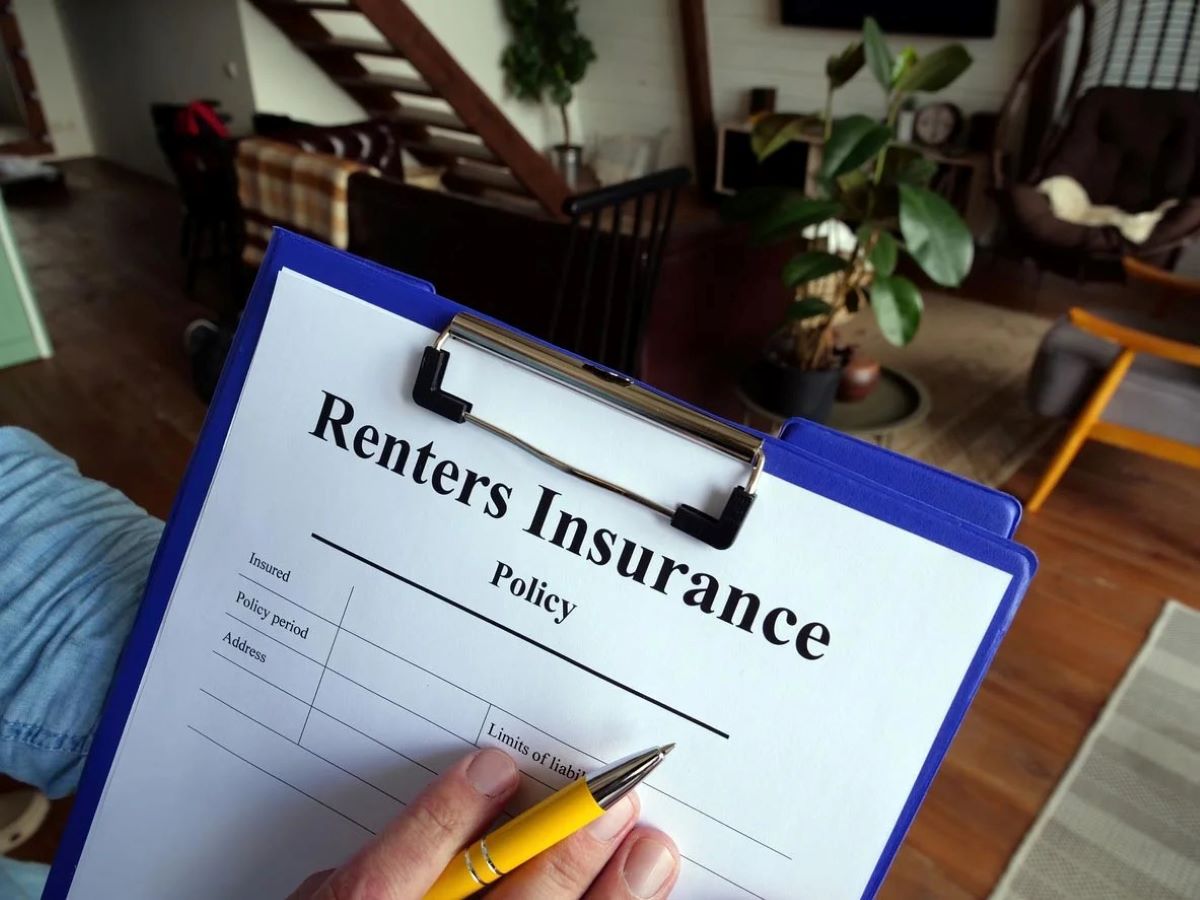

Finance
How Much Is Homeowners Insurance For A Condo?
Published: November 9, 2023
Learn how much homeowners insurance for a condo costs and safeguard your finances with the right coverage. Get a quote today!
(Many of the links in this article redirect to a specific reviewed product. Your purchase of these products through affiliate links helps to generate commission for LiveWell, at no extra cost. Learn more)
Table of Contents
- Introduction
- Factors Affecting Condo Insurance Rates
- Coverage Options for Condo Insurance
- Average Cost of Condo Insurance
- Determining the Right Amount of Coverage
- Factors to Consider when Choosing a Condo Insurance Provider
- Tips for Saving on Condo Insurance
- Understanding the Claims Process
- Frequently Asked Questions (FAQs)
- Conclusion
Introduction
Homeowners insurance is an essential part of protecting one’s investment and providing financial security in case of unexpected events. While homeowners insurance is mandatory for those who own a property, condominium owners have specific insurance needs that differ from traditional homeowners. Condo insurance, also known as HO6 insurance, provides coverage for the individual unit within a condominium complex.
Condo insurance covers the interior space of the unit, including personal belongings, appliances, fixtures, and any improvements made to the unit. It also provides liability coverage in case someone gets injured within the unit or if the policyholder is held liable for damage to someone else’s property. However, the coverage provided by condo insurance varies depending on the policy and the insurance provider.
When it comes to determining the cost of condo insurance, several factors come into play. Insurance companies consider variables such as the location of the condominium, the age of the building, the value of the unit, the desired coverage limits, and the deductible amount. These factors, along with your personal circumstances and claims history, can influence the cost of your condo insurance policy.
In this article, I will delve deeper into the factors that affect condo insurance rates, discuss different coverage options, provide insight into the average cost of condo insurance, and offer tips for saving on your premiums. Additionally, I will outline the process of determining the right amount of coverage for your condo and share considerations for choosing the right insurance provider. Lastly, I will explain the claims process to help you navigate through it seamlessly.
Whether you are a new condo owner, looking for better coverage options, or are simply curious about the ins and outs of condo insurance, this article aims to provide you with a comprehensive understanding of homeowners insurance for condos and empower you to make informed decisions about protecting your investment.
Factors Affecting Condo Insurance Rates
When it comes to calculating the cost of condo insurance, several factors are taken into consideration. Insurance providers analyze these factors to assess the risk associated with insuring your condominium. Understanding these factors can help you make informed decisions when selecting the right policy and provider for your needs. Here are some key factors that can influence condo insurance rates:
- Location: The location of your condo plays a significant role in determining insurance rates. Factors such as the crime rate in the area, proximity to fire stations, and prevalence of natural disasters can impact the risk associated with your property. For example, if you live in an area prone to hurricanes or flooding, your insurance premium may be higher.
- Building Age and Condition: The age and condition of the condominium building can also affect insurance rates. Newer buildings with modern construction and safety features may have lower insurance costs compared to older buildings that may be more susceptible to damage.
- Value of the Unit: The value of your condo unit is a crucial factor in determining insurance rates. The higher the value of your unit, the more coverage you will need, which can result in higher premiums.
- Coverage Limits and Deductibles: The coverage limits and deductibles you choose for your policy can impact the cost of your condo insurance. Higher coverage limits and lower deductibles generally mean higher premiums.
- Security Features: The presence of security features in your condominium complex, such as a gated entry, surveillance cameras, or alarm systems, can potentially lower your insurance rates. These features mitigate the risk of theft or damage, resulting in lower premiums.
- Claims History: Your claims history can impact your insurance rates. If you have a history of frequent claims, insurance companies may perceive you as a higher-risk policyholder, which could lead to higher premiums.
It’s important to note that each insurance provider weighs these factors differently, so it’s worth shopping around and comparing quotes from different companies. Additionally, keeping a clean claims history, maintaining a safe and secure living environment, and being proactive about preventative measures, such as installing smoke detectors and fire extinguishers, can help you secure lower insurance rates.
By understanding and considering these factors, you can make informed decisions when it comes to selecting the right coverage options and insurance provider for your condominium. Remember to assess your individual needs and budget while striking a balance between coverage and affordability.
Coverage Options for Condo Insurance
When it comes to condo insurance, there are several coverage options to consider. Understanding these options and selecting the right ones for your needs is essential to ensure comprehensive protection for your condominium and belongings. Here are some common coverage options offered by condo insurance policies:
- Interior Coverage: This covers the interior structure of your condo unit, including walls, ceilings, floors, and fixtures. It provides protection against perils such as fire, smoke damage, vandalism, and water damage from burst pipes.
- Personal Property Coverage: Personal property coverage protects your belongings, such as furniture, clothing, electronics, and appliances, in case of theft, vandalism, or damage by covered perils. It’s important to assess the value of your personal possessions and choose appropriate coverage limits to ensure you can replace them in the event of a loss.
- Liability Coverage: Liability coverage is crucial in case someone gets injured within your condo unit and sues you for medical expenses or damages. It also provides coverage if you accidentally cause damage to someone else’s property. Liability coverage protects your assets and helps cover legal fees and settlement costs in such situations.
- Loss of Use Coverage: If your condo becomes uninhabitable due to a covered peril, loss of use coverage can help cover additional living expenses, such as hotel bills or temporary rental costs, while your unit is being repaired or rebuilt.
- Add-On Coverages: Depending on your needs and the insurance provider, you may have the option to add extra coverages to your condo insurance policy. These may include coverage for specific valuable items like jewelry or fine art, sewer or drain backup coverage, or earthquake insurance. Consider your specific risks and belongings to determine if any additional coverages are necessary for your peace of mind.
It’s important to carefully review the coverage options and limits offered by different insurance providers. Consider the value of your personal property, the potential risks in your area, and your budget when selecting coverage options. You may also want to assess any additional riders or endorsements available to customize your policy further. It’s recommended to consult with an insurance agent or broker who specializes in condo insurance to ensure you have the right coverage for your specific needs.
Remember that reviewing your insurance policy annually and updating your coverage as needed is crucial. Major life events, such as purchasing valuable items or making significant renovations, may require adjustments to your coverage limits to adequately protect your investments.
Average Cost of Condo Insurance
The cost of condo insurance can vary greatly depending on several factors, including the location of your condominium, the value of your unit, the desired coverage limits, and the insurance provider you choose. On average, condo insurance can range from $100 to $400 per year for a standard policy.
According to recent data, the average cost of condo insurance in the United States is around $600 to $800 per year. However, it’s important to note that this is just an average, and your actual premium may be higher or lower based on your specific circumstances.
Several factors contribute to the variation in condo insurance premiums. As mentioned earlier, the location of your condominium plays a significant role. Condos located in high-risk areas, such as coastal regions or areas prone to natural disasters like hurricanes or earthquakes, may have higher insurance premiums due to increased risk.
The value of your unit also affects the cost of insurance. Higher-value condominiums generally require higher coverage limits, resulting in higher premiums. The desired coverage limits and deductible amount you choose also impact the cost of your policy. Opting for lower coverage limits and higher deductibles may help lower your premium but could leave you with higher out-of-pocket expenses in case of a claim.
Additionally, insurance providers have different underwriting guidelines and rating systems, which can result in varying premium rates for the same coverage. It’s essential to shop around, obtain quotes from multiple providers, and compare the coverage and rates offered to find the best value for your specific needs.
Keep in mind that the cost of condo insurance should not be the sole determining factor when choosing a policy. It’s crucial to consider the reputation of the insurance company, their financial stability, the quality of customer service, and the coverage options provided. A slightly higher premium from a reputable and reliable insurer may be a better choice in the long run.
Remember that various discounts and savings opportunities may be available to help you lower your condo insurance premiums. These can include discounts for security features, multiple policies with the same provider, loyalty discounts, or discounts for certain professional affiliations. It’s worthwhile to inquire about these discounts and see if you qualify for any additional savings.
By considering all these factors and obtaining quotes from multiple insurance providers, you can get a better understanding of the average cost of condo insurance and make an informed decision when selecting a policy.
Determining the Right Amount of Coverage
When it comes to condo insurance, it’s crucial to ensure that you have the right amount of coverage to protect your investment and personal belongings adequately. Determining the appropriate coverage limits can be a balancing act between sufficient protection and affordability. Here are some factors to consider when determining the right amount of coverage for your condominium:
- Assess the Value of Your Personal Belongings: Take inventory of your personal belongings and evaluate their value. This includes furniture, electronics, appliances, clothing, and any other items you own. Consider their replacement cost and make sure your coverage limits reflect the value of these belongings.
- Evaluate the Replacement Cost of Your Unit: Determine the cost to replace the interior structure of your unit, including fixtures, flooring, cabinets, and more. Upgrades or improvements you have made to your unit should also be taken into account.
- Consider Liability Coverage: Assess your potential liability risks. Liability coverage protects you in case someone gets injured within your unit or if you are held responsible for damage to someone else’s property. Evaluating your personal financial situation and assets can help you determine the appropriate amount of liability coverage.
- Review the Condominium Association’s Master Policy: Familiarize yourself with the master policy provided by the condominium association. Understand what is covered under their policy and where your personal coverage needs to fill any gaps. This will help you avoid overlapping coverage or inadequate protection.
- Consult with an Insurance Professional: Seeking guidance from an insurance professional who specializes in condo insurance can be beneficial. They can assess your specific needs, provide expert advice, and help you determine the right amount of coverage based on your individual circumstances.
It’s important to remember that while you want sufficient coverage, you don’t want to pay for more coverage than necessary. Assessing your specific needs and budget is essential in finding the right balance. Additionally, regularly reviewing and updating your coverage limits is crucial. Major life events, such as acquiring valuable items or making significant renovations, may require adjustments to ensure you have adequate protection.
By understanding the value of your personal belongings, assessing potential liability risks, considering the replacement cost of your unit, and reviewing your condominium association’s master policy, you can determine the right amount of coverage for your condo insurance policy. Working with an insurance professional can provide valuable insights and guidance to help you make informed decisions regarding your coverage needs.
Factors to Consider when Choosing a Condo Insurance Provider
Choosing the right condo insurance provider is an important decision that can impact the level of coverage you receive, the quality of customer service you experience, and the overall peace of mind you have regarding your insurance policy. When evaluating insurance providers, it’s essential to consider several factors to ensure you make the best choice for your specific needs. Here are some key factors to consider:
- Reputation and Financial Stability: Research the reputation and financial stability of the insurance provider. Look for companies with a strong track record of customer satisfaction and timely claims processing. Consider checking independent rating agencies, such as A.M. Best or Standard & Poor’s, to gauge their financial strength.
- Coverage Options: Evaluate the coverage options offered by the provider. Ensure they offer the specific coverages you need for your condo, such as interior coverage, personal property coverage, liability coverage, and any additional endorsements or riders you may require. Customize your policy to fit your individual needs.
- Customer Service and Claims Handling: Consider the quality of customer service provided by the insurance company. Look for a provider that is known for responsive and helpful customer support. Additionally, research their claims handling process and investigate customer reviews or testimonials to gauge their efficiency and reliability.
- Premium Rates and Discounts: Compare the premium rates offered by different insurance providers. While cost shouldn’t be the sole determining factor, it’s essential to find a balance between affordable premiums and adequate coverage. Inquire about available discounts, such as multi-policy discounts, security system discounts, or loyalty discounts, which can help reduce your insurance costs.
- Ease of Doing Business: Consider the ease of doing business with the insurance provider. Look for online features like the ability to obtain quotes, make policy changes, or file claims online. This can greatly simplify the insurance process and save you time and effort.
- Recommendations and Referrals: Seek recommendations and referrals from friends, family, or colleagues who have had positive experiences with their condo insurance providers. Their firsthand experiences can provide valuable insights and help narrow down your choices.
By considering these factors, you can make an informed decision when selecting a condo insurance provider. Remember to prioritize factors such as reputation, coverage options, customer service, and financial stability. Obtaining quotes from multiple providers and comparing coverage and rates will help ensure you find the right balance between quality coverage and affordability. Ultimately, choosing a reliable and reputable insurance provider will give you the peace of mind and protection you need for your condominium.
Tips for Saving on Condo Insurance
While condo insurance is a necessary expense to protect your investment, there are several strategies you can employ to help lower your insurance premiums. Here are some tips to consider when looking to save money on your condo insurance:
- Shop Around and Compare Quotes: Obtain quotes from multiple insurance providers to compare rates and coverage options. Each insurer has its own pricing model, so getting quotes from different companies can help you find the most competitive premium.
- Bundle Your Insurance Policies: Consider bundling your condo insurance with other policies, such as auto or umbrella insurance, with the same provider. Insurance companies often offer discounts for bundling multiple policies, which can result in significant savings.
- Opt for Higher Deductibles: Increasing your deductible (the amount you pay out of pocket before your insurance coverage kicks in) can lower your premium. However, make sure you can comfortably afford the higher deductible amount in case of a claim.
- Take Advantage of Available Discounts: Inquire about any available discounts offered by the insurance provider. These can include discounts for having security features like smoke detectors or alarm systems, being a member of certain professional associations, or having a claims-free history. Ask the insurer about all the discounts you may qualify for.
- Maintain a Good Credit Score: In many states, insurance companies are allowed to consider your credit score when determining your premium. Maintaining a good credit score can help you secure better rates on your condo insurance.
- Consider a Higher Security Level: Enhancing the security of your condo can lead to lower insurance rates. Install security systems, deadbolt locks, and smoke detectors, and consider joining a neighborhood watch program to reduce the risk of theft and damage.
- Review and Update Your Coverage Limits Regularly: As your condo and personal belongings go through changes, such as renovations or acquiring new assets, take the time to review your coverage limits. Make sure your policy adequately reflects the current value of your possessions and the replacement cost of your unit.
- Stay Claims-Free: Maintaining a claims-free history can help keep your premiums lower in the long run. Consider whether certain minor losses are worth filing a claim and potentially affecting your future rates. It’s often recommended to save insurance claims for significant losses.
Remember that while saving money is important, it’s essential to strike a balance between cost and coverage. Ensure you have sufficient protection in place to avoid being underinsured. Consult with an insurance professional to help you navigate the savings opportunities without compromising the coverage you need.
By following these tips and exploring all available options, you can find ways to lower your condo insurance premiums while still maintaining the necessary level of protection for your investment and personal belongings.
Understanding the Claims Process
When it comes to condo insurance, understanding the claims process is essential to ensure a smooth and efficient experience in the event of a covered loss. While the specific steps may vary between insurance providers, here is a general overview of how the claims process typically works:
- Report the Claim: As soon as you experience a covered loss, such as fire or theft, promptly report the claim to your insurance provider. Most insurance companies have dedicated claims departments that are available 24/7 for claim reporting.
- Provide Necessary Documentation: The insurance company will request documentation to support your claim, such as a police report for theft or fire incident report for fire damage. Be prepared to provide detailed information about the loss and any evidence or documents that can help validate your claim.
- Claim Evaluation: The insurance company will assign an adjuster to evaluate your claim. The adjuster will assess the damages, review the policy coverage, and determine the amount of loss covered by your insurance policy.
- Repair or Replacement: Once the claim is approved, you can begin the repair or replacement process. Your insurance company may provide a list of preferred contractors or service providers to assist with repairs. Alternatively, you can choose your own contractors, but be sure to communicate with your insurance company regarding the work being done.
- Payment and Deductible: After the repairs or replacements are completed, the insurance company will issue a payment for the covered losses, minus any deductible you are required to pay. Be aware that if the total amount of the loss is lower than your deductible, the insurance company may not provide any reimbursement.
- Dispute Resolution: If you disagree with the insurance company’s evaluation of your claim or the amount offered for reimbursement, you have the right to dispute their decision. Work with your insurance company’s claims department to understand their dispute resolution process and provide any additional evidence or documentation to support your case.
- Claims Record: Keep in mind that multiple claims within a short period of time can impact your future insurance premiums. Assess the significance of each claim before filing, and contact your insurance professional to discuss your options and determine the best course of action.
It’s important to familiarize yourself with your insurance policy and become aware of the specific claims process and requirements of your provider. Understanding the steps involved in filing a claim and the expectations from both parties will help you navigate the process more effectively.
Should you need to file a claim, it’s advisable to document the loss as thoroughly as possible. Take photographs or videos of the damage, keep receipts for any temporary repairs, and retain any relevant documents, such as estimates or invoices.
Remember, effective communication with your insurance company throughout the claims process is essential. Don’t hesitate to reach out to your insurance provider or agent with any questions or concerns you may have. They are there to help guide you through the process and ensure a satisfactory resolution to your claim.
Frequently Asked Questions (FAQs)
Here are some frequently asked questions about condo insurance:
-
Do I need condo insurance if my condo association has insurance?
Yes, you still need condo insurance even if your condo association has insurance. The association’s insurance typically covers the building structure and common areas, but it does not provide coverage for the interior of your unit or your personal belongings. Condo insurance is designed to protect your unit and provide liability coverage in case of accidents or damage within your unit.
-
What does condo insurance cover?
Condo insurance covers the interior structure of your unit, including walls, floors, fixtures, and personal belongings. It also provides liability coverage in case someone gets injured within your unit or if you cause damage to someone else’s property. Additional coverages can include loss of use coverage, which helps with temporary living expenses if your unit becomes uninhabitable, and add-on coverages for valuable items or specific risks.
-
How much condo insurance do I need?
The amount of condo insurance you need depends on factors such as the value of your personal belongings, the replacement cost of your unit, and your potential liability risks. It’s essential to assess your specific needs and consult with an insurance professional to determine the appropriate coverage limits for your condominium.
-
How can I lower my condo insurance premiums?
To lower your condo insurance premiums, consider shopping around for quotes from multiple insurance providers, increasing your deductible, bundling your policies, taking advantage of available discounts, maintaining good credit, and enhancing the security features of your condo unit. Regularly reviewing and updating your coverage limits can also help ensure you are not paying for more coverage than necessary.
-
What should I do if I need to file a claim?
If you need to file a claim, promptly notify your insurance provider and provide the necessary documentation to support your claim. An adjuster will evaluate your claim, and once approved, you can proceed with repairs or replacements. Be sure to communicate with your insurance company throughout the process, and if you have any concerns or disputes, follow their designated dispute resolution process.
-
Can I cancel my condo insurance policy?
Yes, you can cancel your condo insurance policy. However, it’s important to consider the potential risks and financial consequences of not having adequate coverage. If you decide to cancel, make sure you have alternative insurance or are abiding by any condominium association or mortgage requirements regarding insurance coverage.
These are just a few common questions about condo insurance. If you have specific concerns or unique circumstances, it’s always best to consult with an insurance professional who can provide personalized guidance based on your needs.
Conclusion
Condo insurance is a vital component of protecting your investment and providing financial security for unexpected events. Understanding the factors that affect condo insurance rates, the coverage options available, and how to determine the right amount of coverage are crucial in making informed decisions. Additionally, considering factors such as the reputation of insurance providers, coverage options, customer service, and cost-saving opportunities can help you choose the right condo insurance provider for your specific needs.
By following tips such as shopping around for quotes, bundling policies, increasing deductibles, and maintaining a good credit score, you can potentially lower your condo insurance premiums while still maintaining adequate coverage. Understanding the claims process and being prepared to provide the necessary documentation can facilitate a smooth claims experience if the need arises.
Remember to regularly review and update your coverage limits to ensure they adequately reflect the value of your personal belongings and the replacement cost of your unit. Seek guidance from insurance professionals to ensure you have the right coverage and to address any specific concerns you may have.
With the right condo insurance policy in place, you can have peace of mind knowing that you are protected against unforeseen events that may damage your unit or personal belongings. Take the time to evaluate your options, understand your policy, and make the choices that best suit your needs and budget.














